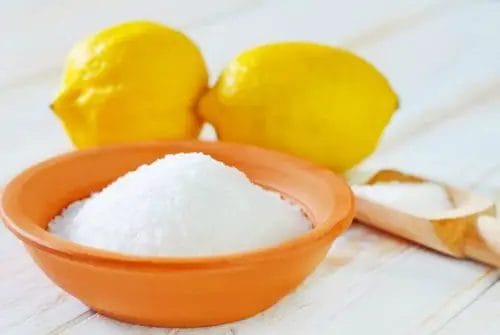What makes a good Citric Acid Substitute ?
Citric acid acts as a natural antioxidant, and it is primarily found in citrus foods, such as limes or lemons.
Because of its antioxidant qualities, it protects the body from free radicals. Therefore, consuming this substance enhances heart health and prevents cancer.
Citric Acid Substitutes
1. Lemon Juice
Probably the best substitute is lemon juice. For instance, if you want to make cheese, you can either use lemon juice or vinegar to coagulate the curd. You can switch lemon juice for any dish that calls for citric acid as an ingredient.
2. Tartaric Acid and Cream of Tartar
One citric acid substitute that offers the same health benefits is tartaric acid. You can find this acid in grapes, and it is also sold as a powder online. While tartaric acid is water-soluble and is often sold as a powder, cream of tartar serves as an acidifier too.
If you want to use cream of tartar as a substitute, simple replace one tablespoon of cream of tartar for 3/4 tablespoon of citric acid. While cream of tartar is considered tartaric acid, each of the substances have a different pH, and, therefore, each provides different results. Keep this in mind when making a substitution.
3. White Distilled Vinegar and Apple Cider Vinegar
Another substitute to try is white distilled vinegar. This acetic acid provides a similar sour flavor. While you can use other kinds of vinegar, white distilled vinegar is better, as other vinegars can alter the taste of a recipe. You may consider adding apple cider vinegar to some recipes. However, you will receive a closer taste to citric acid if you opt for white distilled vinegar instead.
4. Crushed Vitamin C Tablets or Ascorbic Acid
You can also substitute citric acid with crushed vitamin C tablets if you want to use the substitute as a preservative. Present in citrus fruits, vitamin C is also referred to as ascorbic acid. It is important to know the difference between citric acid and ascorbic acid so that you have this information about what you are receiving nutritionally, as well as when you preserve food.
How Citric Acid and Ascorbic Acid Differ
The chemical makeup of citric acid and ascorbic acid are completely different in terms of what they do.
Citric acid is a weaker antioxidant than ascorbic acid. Ascorbic acid works at repairing cells and protecting them, while citric acid makes certain minerals, such as calcium and magnesium, more bioavailable.
An Alkalizing Agent
Besides being an antioxidant, citric acid serves as an alkalizing agent. Therefore, it reduces the body’s acidity.
This acidity builds up when people consume too many processed foods. By holding this role, citric acid prevents the formation of kidney stones.
However, you do not have to completely depend on citric acid for providing these health benefits. You can also rely on substitutes that supply the same advantages. Organically, citric acid, which is available in a powder or crystals, is derived from citrus fruits. Therefore, you can use lemon or lime to flavor recipes instead of the powder.
Canning and Preserving Foods
Besides being added to recipes, citric acid powder is used for canning and preserving foods. In this case, the powder or crystals of the substance are used.
Also, the powdered version adds zest to candies or juices. The citric reference means the acid replicates the sour taste in citrus. Citric acid is also used for naturally softening a hard water supply.
How to Make a Powder of Citric Acid
If you want to make a powder of citric acid instead of purchasing the substance online, simply measure a cup of lime juice, and add it with one teaspoon of calcium hydroxide to a pot.
Pour the solution, when heated, into a glass container. Once the solution cools, pour it into a coffee filter. Remove the particles of calcium citrate from the filter with a spoon.
Add the powder to a container that is considered oven-safe. This type of sour salt is an ideal way to preserve foods and enhance flavors.

